LAWS20060: Taxation Law Assignment - Individual Assessment 2019
VerifiedAdded on 2022/11/30
|12
|3350
|258
Homework Assignment
AI Summary
This assignment solution addresses various aspects of Australian taxation law, providing detailed answers to several questions. Question 1 covers topics such as the computation of effective life for depreciable assets, tax offsets, top tax rates, capital gains tax exemptions, and the taxation of CGT assets. Question 2 explores the deductibility of expenses under section 8.1 of the Income Tax Assessment Act 1997, analyzing scenarios involving interest expenses, mobile phone charges, babysitting costs, and stolen goods. Question 3 focuses on capital gains tax (CGT) events, including the grant of a lease (CGT event F2), options to purchase property (CGT event B1), and the main residence exemption. Additionally, it includes a CGT computation example. Question 4 examines the tax treatment of prize winnings and income received by employees, including the application of relevant sections of the Income Tax Assessment Act 1997. The assignment demonstrates an understanding of relevant legislation, case law, and tax rulings in the context of practical scenarios.
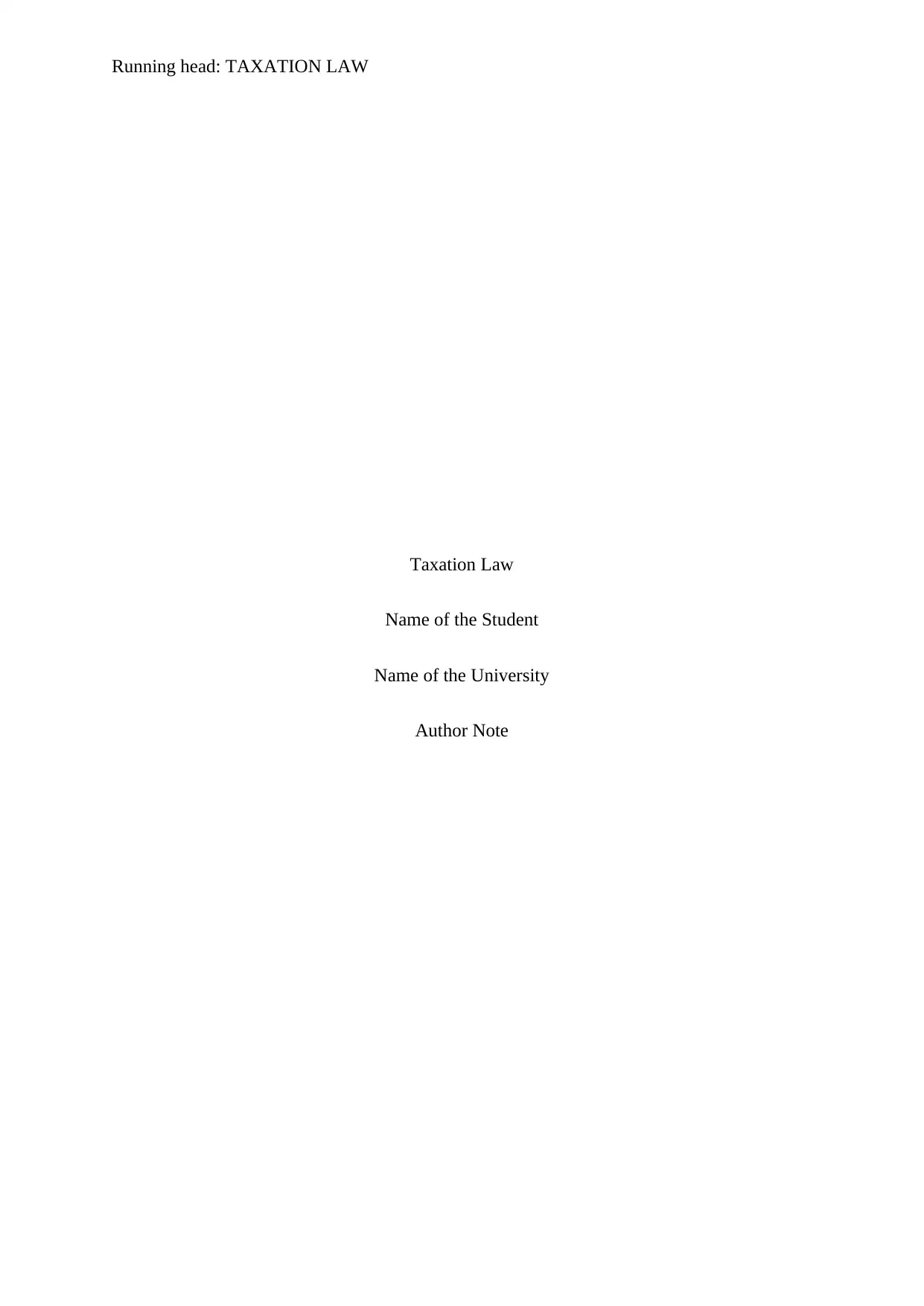
Running head: TAXATION LAW
Taxation Law
Name of the Student
Name of the University
Author Note
Taxation Law
Name of the Student
Name of the University
Author Note
Paraphrase This Document
Need a fresh take? Get an instant paraphrase of this document with our AI Paraphraser
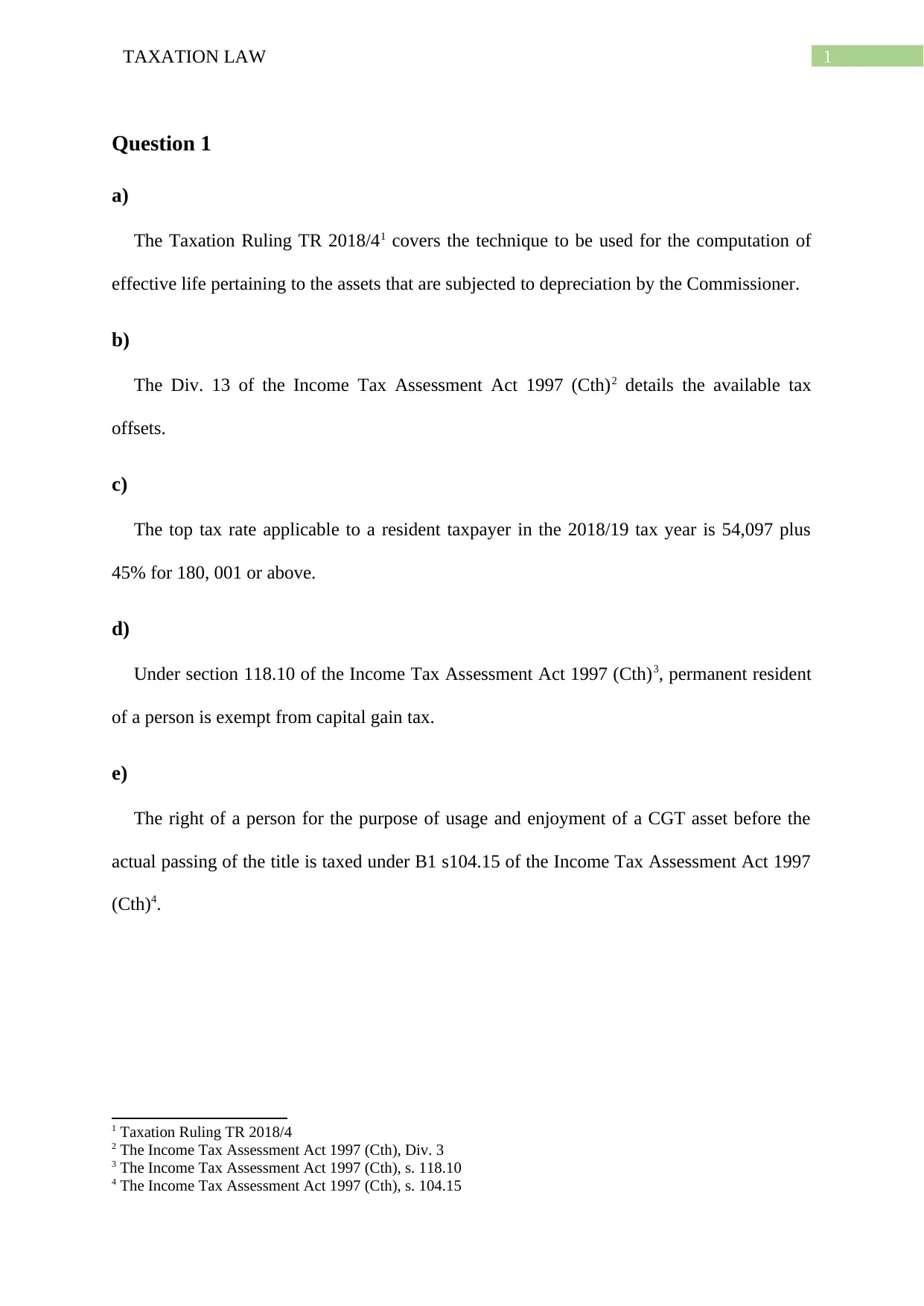
1TAXATION LAW
Question 1
a)
The Taxation Ruling TR 2018/41 covers the technique to be used for the computation of
effective life pertaining to the assets that are subjected to depreciation by the Commissioner.
b)
The Div. 13 of the Income Tax Assessment Act 1997 (Cth)2 details the available tax
offsets.
c)
The top tax rate applicable to a resident taxpayer in the 2018/19 tax year is 54,097 plus
45% for 180, 001 or above.
d)
Under section 118.10 of the Income Tax Assessment Act 1997 (Cth)3, permanent resident
of a person is exempt from capital gain tax.
e)
The right of a person for the purpose of usage and enjoyment of a CGT asset before the
actual passing of the title is taxed under B1 s104.15 of the Income Tax Assessment Act 1997
(Cth)4.
1 Taxation Ruling TR 2018/4
2 The Income Tax Assessment Act 1997 (Cth), Div. 3
3 The Income Tax Assessment Act 1997 (Cth), s. 118.10
4 The Income Tax Assessment Act 1997 (Cth), s. 104.15
Question 1
a)
The Taxation Ruling TR 2018/41 covers the technique to be used for the computation of
effective life pertaining to the assets that are subjected to depreciation by the Commissioner.
b)
The Div. 13 of the Income Tax Assessment Act 1997 (Cth)2 details the available tax
offsets.
c)
The top tax rate applicable to a resident taxpayer in the 2018/19 tax year is 54,097 plus
45% for 180, 001 or above.
d)
Under section 118.10 of the Income Tax Assessment Act 1997 (Cth)3, permanent resident
of a person is exempt from capital gain tax.
e)
The right of a person for the purpose of usage and enjoyment of a CGT asset before the
actual passing of the title is taxed under B1 s104.15 of the Income Tax Assessment Act 1997
(Cth)4.
1 Taxation Ruling TR 2018/4
2 The Income Tax Assessment Act 1997 (Cth), Div. 3
3 The Income Tax Assessment Act 1997 (Cth), s. 118.10
4 The Income Tax Assessment Act 1997 (Cth), s. 104.15
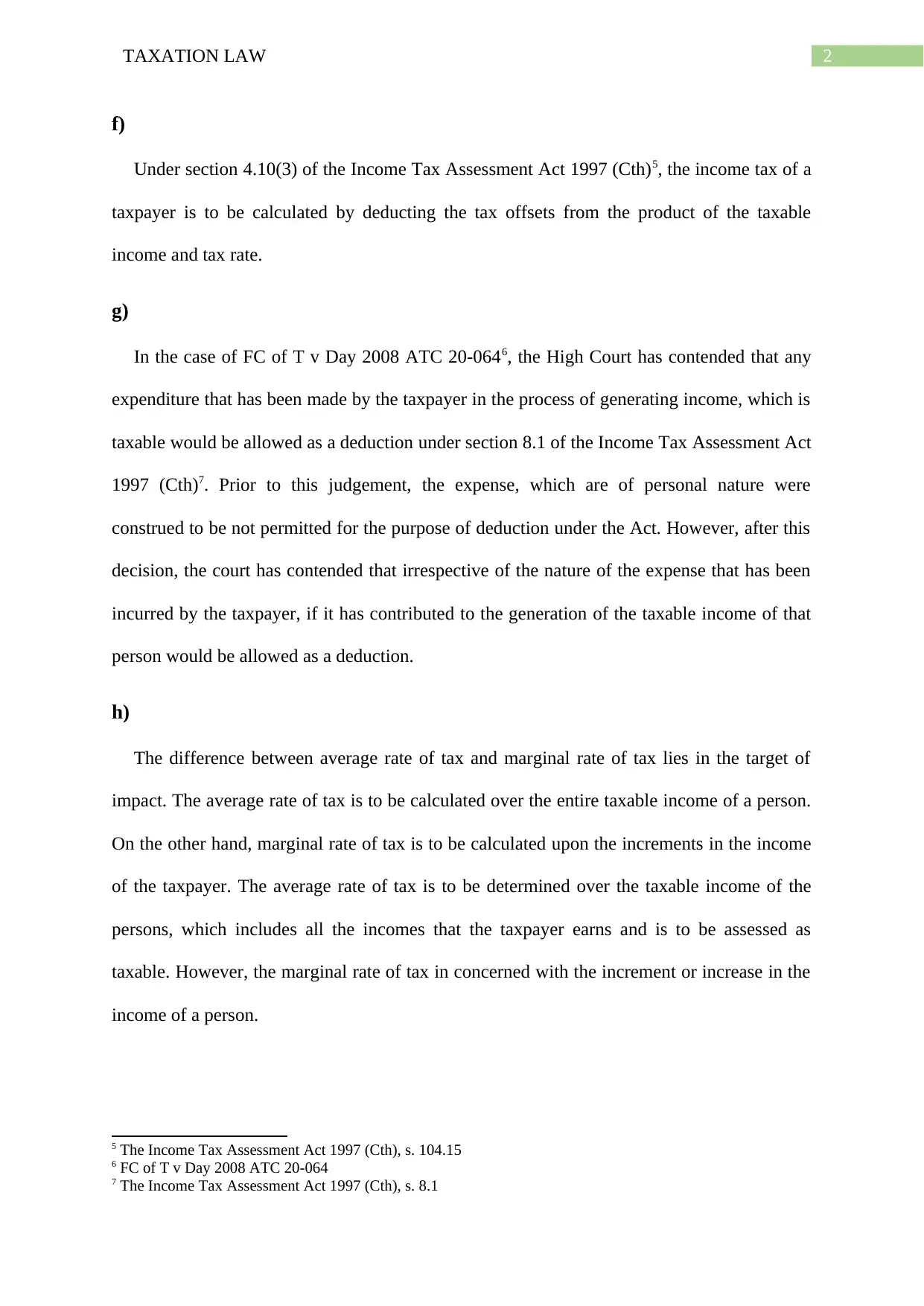
2TAXATION LAW
f)
Under section 4.10(3) of the Income Tax Assessment Act 1997 (Cth)5, the income tax of a
taxpayer is to be calculated by deducting the tax offsets from the product of the taxable
income and tax rate.
g)
In the case of FC of T v Day 2008 ATC 20-0646, the High Court has contended that any
expenditure that has been made by the taxpayer in the process of generating income, which is
taxable would be allowed as a deduction under section 8.1 of the Income Tax Assessment Act
1997 (Cth)7. Prior to this judgement, the expense, which are of personal nature were
construed to be not permitted for the purpose of deduction under the Act. However, after this
decision, the court has contended that irrespective of the nature of the expense that has been
incurred by the taxpayer, if it has contributed to the generation of the taxable income of that
person would be allowed as a deduction.
h)
The difference between average rate of tax and marginal rate of tax lies in the target of
impact. The average rate of tax is to be calculated over the entire taxable income of a person.
On the other hand, marginal rate of tax is to be calculated upon the increments in the income
of the taxpayer. The average rate of tax is to be determined over the taxable income of the
persons, which includes all the incomes that the taxpayer earns and is to be assessed as
taxable. However, the marginal rate of tax in concerned with the increment or increase in the
income of a person.
5 The Income Tax Assessment Act 1997 (Cth), s. 104.15
6 FC of T v Day 2008 ATC 20-064
7 The Income Tax Assessment Act 1997 (Cth), s. 8.1
f)
Under section 4.10(3) of the Income Tax Assessment Act 1997 (Cth)5, the income tax of a
taxpayer is to be calculated by deducting the tax offsets from the product of the taxable
income and tax rate.
g)
In the case of FC of T v Day 2008 ATC 20-0646, the High Court has contended that any
expenditure that has been made by the taxpayer in the process of generating income, which is
taxable would be allowed as a deduction under section 8.1 of the Income Tax Assessment Act
1997 (Cth)7. Prior to this judgement, the expense, which are of personal nature were
construed to be not permitted for the purpose of deduction under the Act. However, after this
decision, the court has contended that irrespective of the nature of the expense that has been
incurred by the taxpayer, if it has contributed to the generation of the taxable income of that
person would be allowed as a deduction.
h)
The difference between average rate of tax and marginal rate of tax lies in the target of
impact. The average rate of tax is to be calculated over the entire taxable income of a person.
On the other hand, marginal rate of tax is to be calculated upon the increments in the income
of the taxpayer. The average rate of tax is to be determined over the taxable income of the
persons, which includes all the incomes that the taxpayer earns and is to be assessed as
taxable. However, the marginal rate of tax in concerned with the increment or increase in the
income of a person.
5 The Income Tax Assessment Act 1997 (Cth), s. 104.15
6 FC of T v Day 2008 ATC 20-064
7 The Income Tax Assessment Act 1997 (Cth), s. 8.1
⊘ This is a preview!⊘
Do you want full access?
Subscribe today to unlock all pages.

Trusted by 1+ million students worldwide
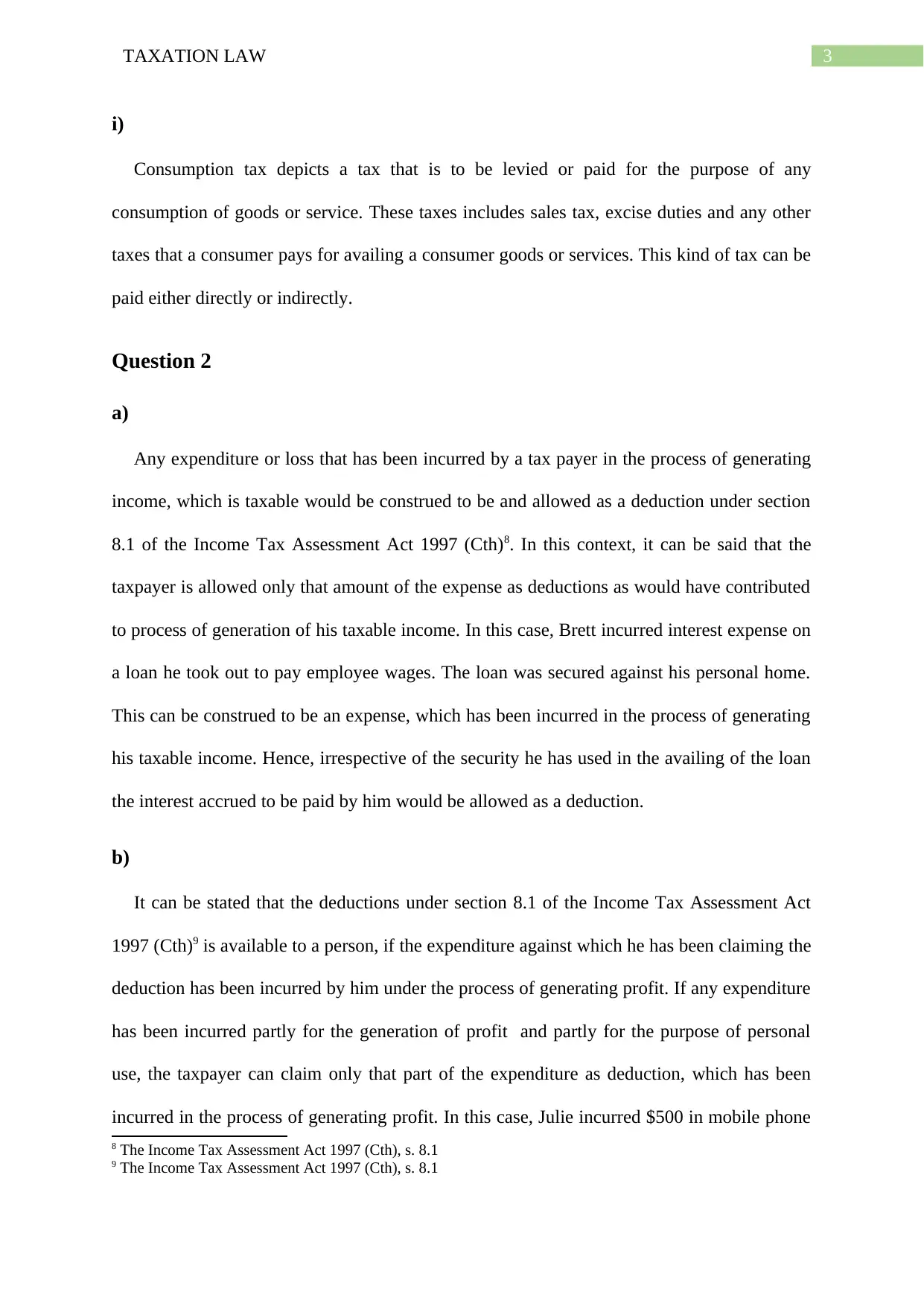
3TAXATION LAW
i)
Consumption tax depicts a tax that is to be levied or paid for the purpose of any
consumption of goods or service. These taxes includes sales tax, excise duties and any other
taxes that a consumer pays for availing a consumer goods or services. This kind of tax can be
paid either directly or indirectly.
Question 2
a)
Any expenditure or loss that has been incurred by a tax payer in the process of generating
income, which is taxable would be construed to be and allowed as a deduction under section
8.1 of the Income Tax Assessment Act 1997 (Cth)8. In this context, it can be said that the
taxpayer is allowed only that amount of the expense as deductions as would have contributed
to process of generation of his taxable income. In this case, Brett incurred interest expense on
a loan he took out to pay employee wages. The loan was secured against his personal home.
This can be construed to be an expense, which has been incurred in the process of generating
his taxable income. Hence, irrespective of the security he has used in the availing of the loan
the interest accrued to be paid by him would be allowed as a deduction.
b)
It can be stated that the deductions under section 8.1 of the Income Tax Assessment Act
1997 (Cth)9 is available to a person, if the expenditure against which he has been claiming the
deduction has been incurred by him under the process of generating profit. If any expenditure
has been incurred partly for the generation of profit and partly for the purpose of personal
use, the taxpayer can claim only that part of the expenditure as deduction, which has been
incurred in the process of generating profit. In this case, Julie incurred $500 in mobile phone
8 The Income Tax Assessment Act 1997 (Cth), s. 8.1
9 The Income Tax Assessment Act 1997 (Cth), s. 8.1
i)
Consumption tax depicts a tax that is to be levied or paid for the purpose of any
consumption of goods or service. These taxes includes sales tax, excise duties and any other
taxes that a consumer pays for availing a consumer goods or services. This kind of tax can be
paid either directly or indirectly.
Question 2
a)
Any expenditure or loss that has been incurred by a tax payer in the process of generating
income, which is taxable would be construed to be and allowed as a deduction under section
8.1 of the Income Tax Assessment Act 1997 (Cth)8. In this context, it can be said that the
taxpayer is allowed only that amount of the expense as deductions as would have contributed
to process of generation of his taxable income. In this case, Brett incurred interest expense on
a loan he took out to pay employee wages. The loan was secured against his personal home.
This can be construed to be an expense, which has been incurred in the process of generating
his taxable income. Hence, irrespective of the security he has used in the availing of the loan
the interest accrued to be paid by him would be allowed as a deduction.
b)
It can be stated that the deductions under section 8.1 of the Income Tax Assessment Act
1997 (Cth)9 is available to a person, if the expenditure against which he has been claiming the
deduction has been incurred by him under the process of generating profit. If any expenditure
has been incurred partly for the generation of profit and partly for the purpose of personal
use, the taxpayer can claim only that part of the expenditure as deduction, which has been
incurred in the process of generating profit. In this case, Julie incurred $500 in mobile phone
8 The Income Tax Assessment Act 1997 (Cth), s. 8.1
9 The Income Tax Assessment Act 1997 (Cth), s. 8.1
Paraphrase This Document
Need a fresh take? Get an instant paraphrase of this document with our AI Paraphraser
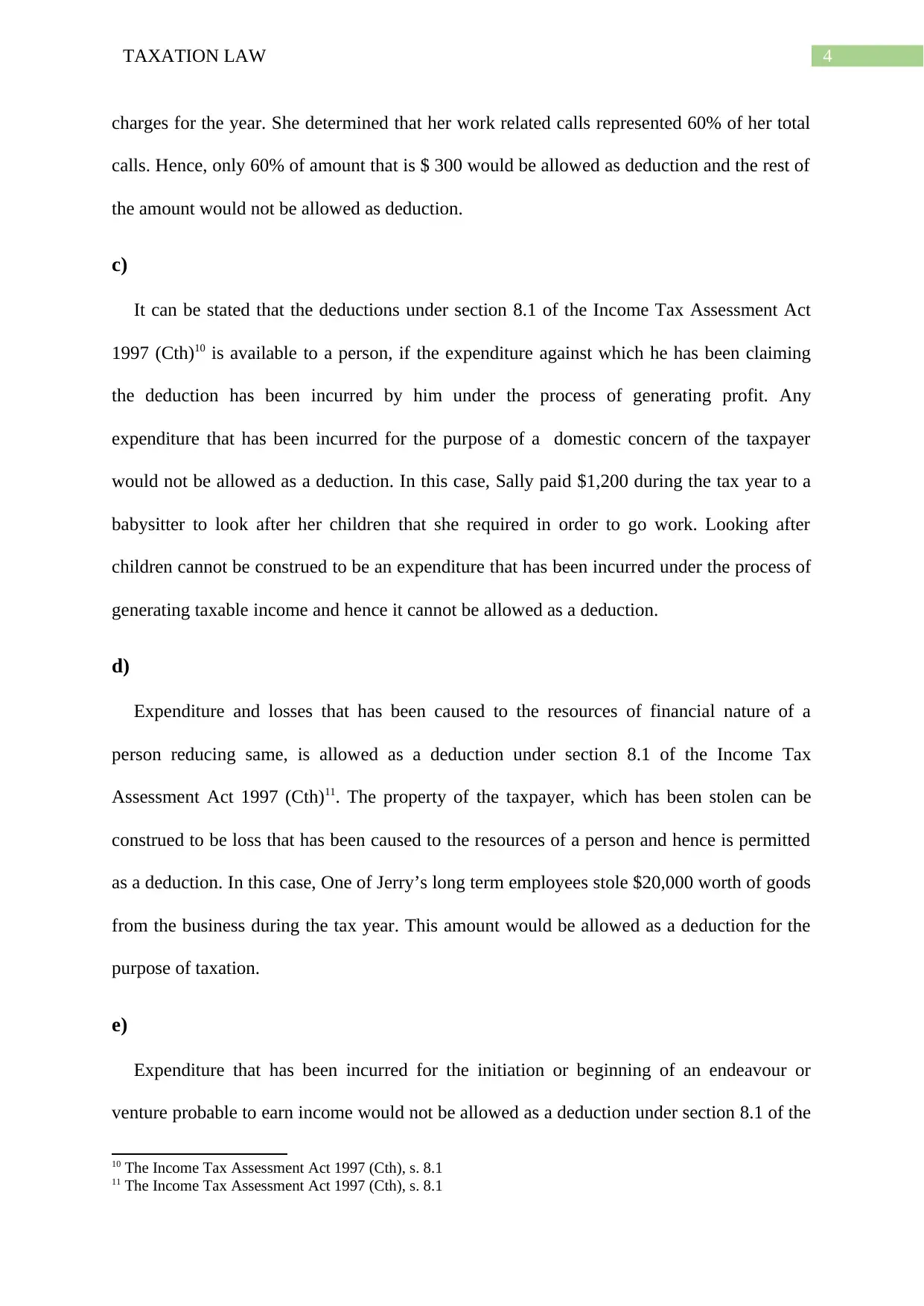
4TAXATION LAW
charges for the year. She determined that her work related calls represented 60% of her total
calls. Hence, only 60% of amount that is $ 300 would be allowed as deduction and the rest of
the amount would not be allowed as deduction.
c)
It can be stated that the deductions under section 8.1 of the Income Tax Assessment Act
1997 (Cth)10 is available to a person, if the expenditure against which he has been claiming
the deduction has been incurred by him under the process of generating profit. Any
expenditure that has been incurred for the purpose of a domestic concern of the taxpayer
would not be allowed as a deduction. In this case, Sally paid $1,200 during the tax year to a
babysitter to look after her children that she required in order to go work. Looking after
children cannot be construed to be an expenditure that has been incurred under the process of
generating taxable income and hence it cannot be allowed as a deduction.
d)
Expenditure and losses that has been caused to the resources of financial nature of a
person reducing same, is allowed as a deduction under section 8.1 of the Income Tax
Assessment Act 1997 (Cth)11. The property of the taxpayer, which has been stolen can be
construed to be loss that has been caused to the resources of a person and hence is permitted
as a deduction. In this case, One of Jerry’s long term employees stole $20,000 worth of goods
from the business during the tax year. This amount would be allowed as a deduction for the
purpose of taxation.
e)
Expenditure that has been incurred for the initiation or beginning of an endeavour or
venture probable to earn income would not be allowed as a deduction under section 8.1 of the
10 The Income Tax Assessment Act 1997 (Cth), s. 8.1
11 The Income Tax Assessment Act 1997 (Cth), s. 8.1
charges for the year. She determined that her work related calls represented 60% of her total
calls. Hence, only 60% of amount that is $ 300 would be allowed as deduction and the rest of
the amount would not be allowed as deduction.
c)
It can be stated that the deductions under section 8.1 of the Income Tax Assessment Act
1997 (Cth)10 is available to a person, if the expenditure against which he has been claiming
the deduction has been incurred by him under the process of generating profit. Any
expenditure that has been incurred for the purpose of a domestic concern of the taxpayer
would not be allowed as a deduction. In this case, Sally paid $1,200 during the tax year to a
babysitter to look after her children that she required in order to go work. Looking after
children cannot be construed to be an expenditure that has been incurred under the process of
generating taxable income and hence it cannot be allowed as a deduction.
d)
Expenditure and losses that has been caused to the resources of financial nature of a
person reducing same, is allowed as a deduction under section 8.1 of the Income Tax
Assessment Act 1997 (Cth)11. The property of the taxpayer, which has been stolen can be
construed to be loss that has been caused to the resources of a person and hence is permitted
as a deduction. In this case, One of Jerry’s long term employees stole $20,000 worth of goods
from the business during the tax year. This amount would be allowed as a deduction for the
purpose of taxation.
e)
Expenditure that has been incurred for the initiation or beginning of an endeavour or
venture probable to earn income would not be allowed as a deduction under section 8.1 of the
10 The Income Tax Assessment Act 1997 (Cth), s. 8.1
11 The Income Tax Assessment Act 1997 (Cth), s. 8.1
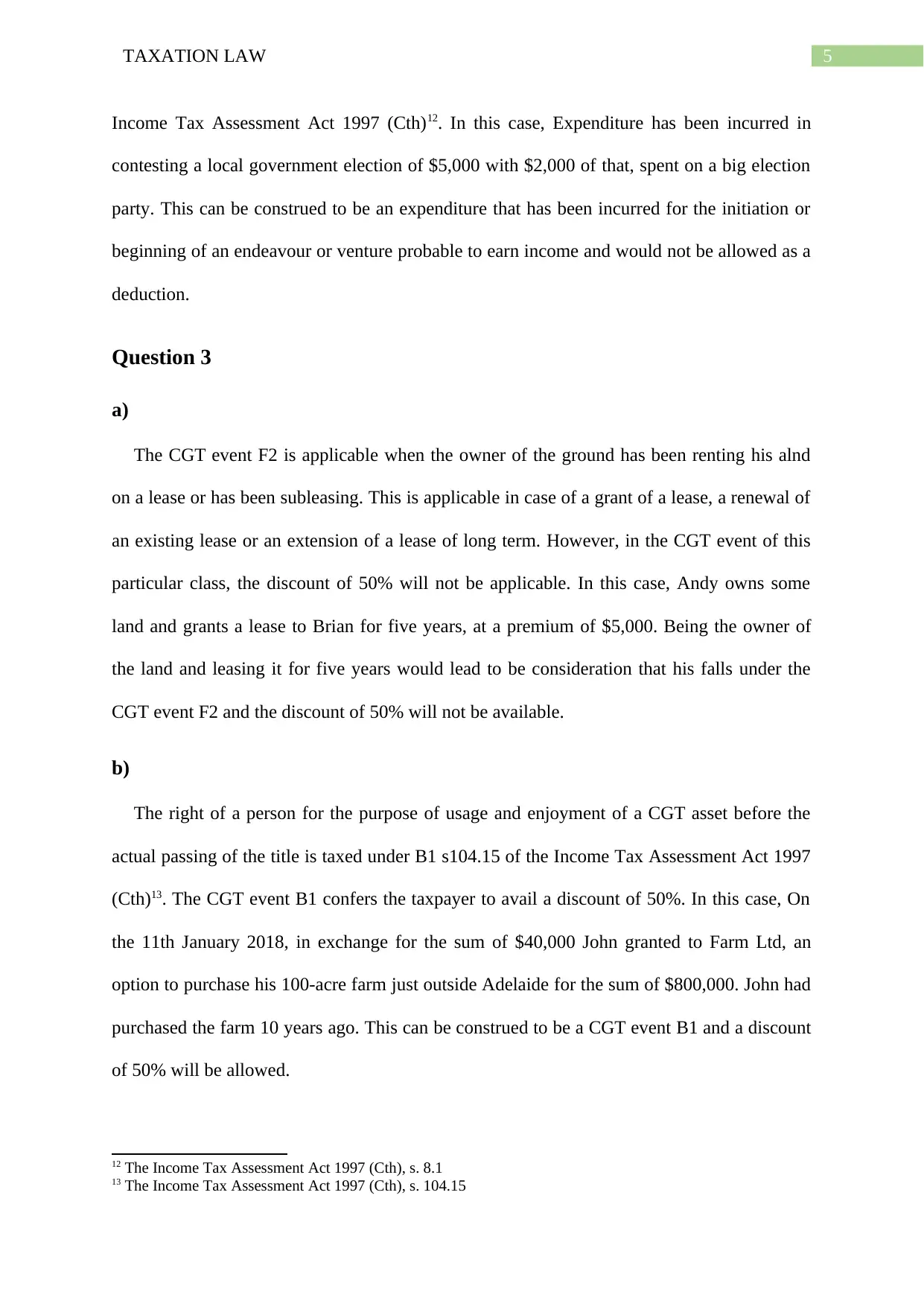
5TAXATION LAW
Income Tax Assessment Act 1997 (Cth)12. In this case, Expenditure has been incurred in
contesting a local government election of $5,000 with $2,000 of that, spent on a big election
party. This can be construed to be an expenditure that has been incurred for the initiation or
beginning of an endeavour or venture probable to earn income and would not be allowed as a
deduction.
Question 3
a)
The CGT event F2 is applicable when the owner of the ground has been renting his alnd
on a lease or has been subleasing. This is applicable in case of a grant of a lease, a renewal of
an existing lease or an extension of a lease of long term. However, in the CGT event of this
particular class, the discount of 50% will not be applicable. In this case, Andy owns some
land and grants a lease to Brian for five years, at a premium of $5,000. Being the owner of
the land and leasing it for five years would lead to be consideration that his falls under the
CGT event F2 and the discount of 50% will not be available.
b)
The right of a person for the purpose of usage and enjoyment of a CGT asset before the
actual passing of the title is taxed under B1 s104.15 of the Income Tax Assessment Act 1997
(Cth)13. The CGT event B1 confers the taxpayer to avail a discount of 50%. In this case, On
the 11th January 2018, in exchange for the sum of $40,000 John granted to Farm Ltd, an
option to purchase his 100-acre farm just outside Adelaide for the sum of $800,000. John had
purchased the farm 10 years ago. This can be construed to be a CGT event B1 and a discount
of 50% will be allowed.
12 The Income Tax Assessment Act 1997 (Cth), s. 8.1
13 The Income Tax Assessment Act 1997 (Cth), s. 104.15
Income Tax Assessment Act 1997 (Cth)12. In this case, Expenditure has been incurred in
contesting a local government election of $5,000 with $2,000 of that, spent on a big election
party. This can be construed to be an expenditure that has been incurred for the initiation or
beginning of an endeavour or venture probable to earn income and would not be allowed as a
deduction.
Question 3
a)
The CGT event F2 is applicable when the owner of the ground has been renting his alnd
on a lease or has been subleasing. This is applicable in case of a grant of a lease, a renewal of
an existing lease or an extension of a lease of long term. However, in the CGT event of this
particular class, the discount of 50% will not be applicable. In this case, Andy owns some
land and grants a lease to Brian for five years, at a premium of $5,000. Being the owner of
the land and leasing it for five years would lead to be consideration that his falls under the
CGT event F2 and the discount of 50% will not be available.
b)
The right of a person for the purpose of usage and enjoyment of a CGT asset before the
actual passing of the title is taxed under B1 s104.15 of the Income Tax Assessment Act 1997
(Cth)13. The CGT event B1 confers the taxpayer to avail a discount of 50%. In this case, On
the 11th January 2018, in exchange for the sum of $40,000 John granted to Farm Ltd, an
option to purchase his 100-acre farm just outside Adelaide for the sum of $800,000. John had
purchased the farm 10 years ago. This can be construed to be a CGT event B1 and a discount
of 50% will be allowed.
12 The Income Tax Assessment Act 1997 (Cth), s. 8.1
13 The Income Tax Assessment Act 1997 (Cth), s. 104.15
⊘ This is a preview!⊘
Do you want full access?
Subscribe today to unlock all pages.

Trusted by 1+ million students worldwide
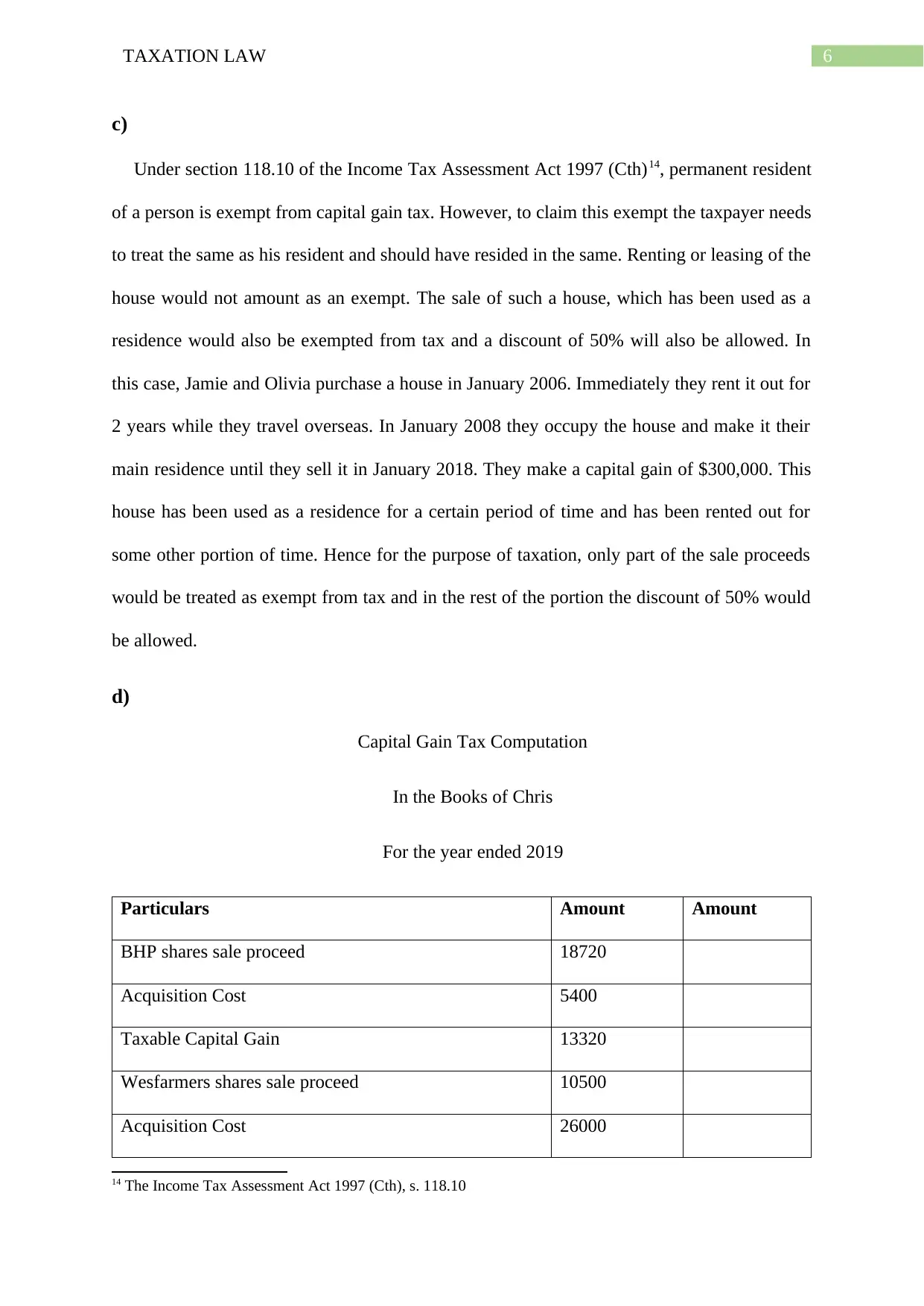
6TAXATION LAW
c)
Under section 118.10 of the Income Tax Assessment Act 1997 (Cth)14, permanent resident
of a person is exempt from capital gain tax. However, to claim this exempt the taxpayer needs
to treat the same as his resident and should have resided in the same. Renting or leasing of the
house would not amount as an exempt. The sale of such a house, which has been used as a
residence would also be exempted from tax and a discount of 50% will also be allowed. In
this case, Jamie and Olivia purchase a house in January 2006. Immediately they rent it out for
2 years while they travel overseas. In January 2008 they occupy the house and make it their
main residence until they sell it in January 2018. They make a capital gain of $300,000. This
house has been used as a residence for a certain period of time and has been rented out for
some other portion of time. Hence for the purpose of taxation, only part of the sale proceeds
would be treated as exempt from tax and in the rest of the portion the discount of 50% would
be allowed.
d)
Capital Gain Tax Computation
In the Books of Chris
For the year ended 2019
Particulars Amount Amount
BHP shares sale proceed 18720
Acquisition Cost 5400
Taxable Capital Gain 13320
Wesfarmers shares sale proceed 10500
Acquisition Cost 26000
14 The Income Tax Assessment Act 1997 (Cth), s. 118.10
c)
Under section 118.10 of the Income Tax Assessment Act 1997 (Cth)14, permanent resident
of a person is exempt from capital gain tax. However, to claim this exempt the taxpayer needs
to treat the same as his resident and should have resided in the same. Renting or leasing of the
house would not amount as an exempt. The sale of such a house, which has been used as a
residence would also be exempted from tax and a discount of 50% will also be allowed. In
this case, Jamie and Olivia purchase a house in January 2006. Immediately they rent it out for
2 years while they travel overseas. In January 2008 they occupy the house and make it their
main residence until they sell it in January 2018. They make a capital gain of $300,000. This
house has been used as a residence for a certain period of time and has been rented out for
some other portion of time. Hence for the purpose of taxation, only part of the sale proceeds
would be treated as exempt from tax and in the rest of the portion the discount of 50% would
be allowed.
d)
Capital Gain Tax Computation
In the Books of Chris
For the year ended 2019
Particulars Amount Amount
BHP shares sale proceed 18720
Acquisition Cost 5400
Taxable Capital Gain 13320
Wesfarmers shares sale proceed 10500
Acquisition Cost 26000
14 The Income Tax Assessment Act 1997 (Cth), s. 118.10
Paraphrase This Document
Need a fresh take? Get an instant paraphrase of this document with our AI Paraphraser
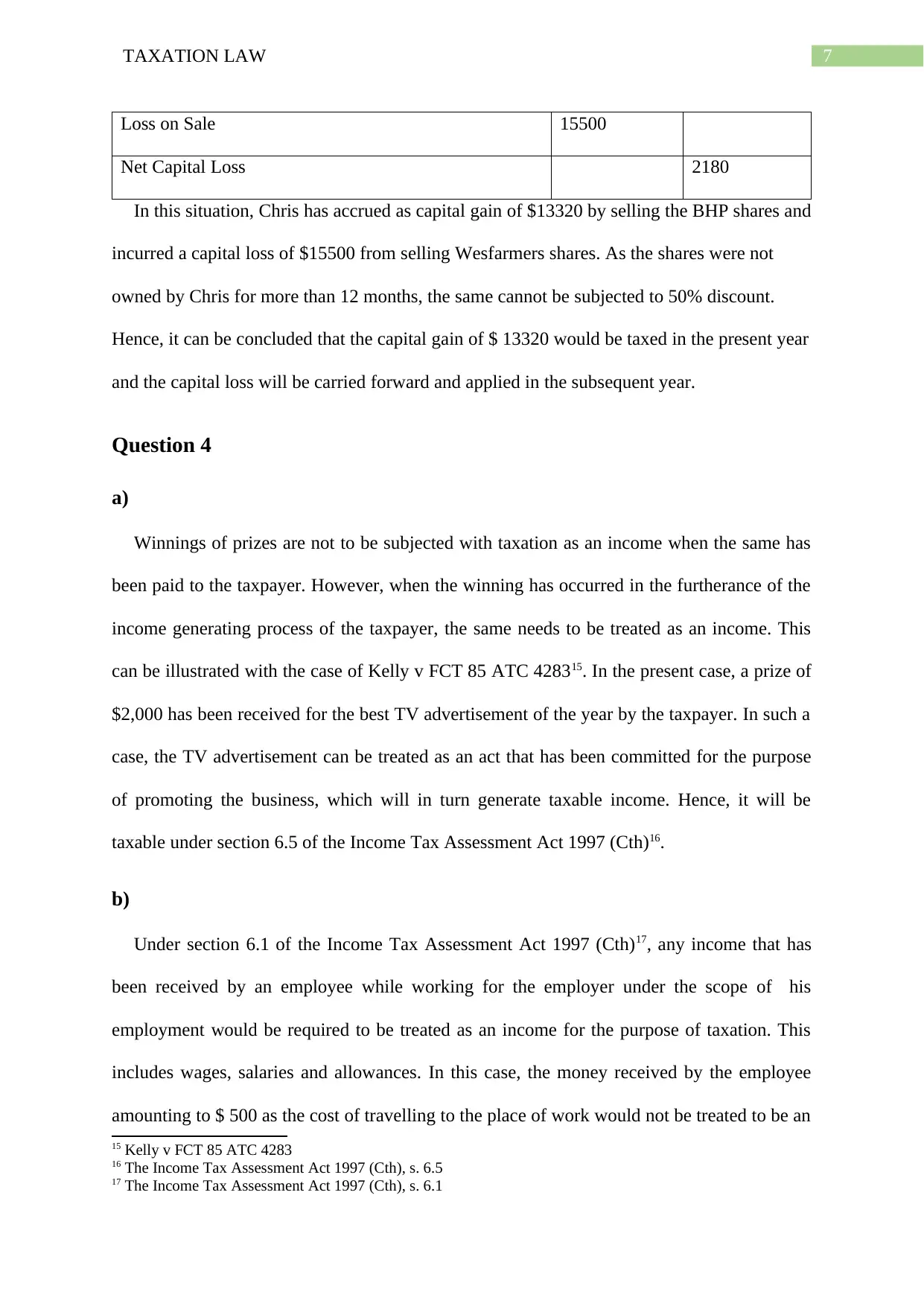
7TAXATION LAW
Loss on Sale 15500
Net Capital Loss 2180
In this situation, Chris has accrued as capital gain of $13320 by selling the BHP shares and
incurred a capital loss of $15500 from selling Wesfarmers shares. As the shares were not
owned by Chris for more than 12 months, the same cannot be subjected to 50% discount.
Hence, it can be concluded that the capital gain of $ 13320 would be taxed in the present year
and the capital loss will be carried forward and applied in the subsequent year.
Question 4
a)
Winnings of prizes are not to be subjected with taxation as an income when the same has
been paid to the taxpayer. However, when the winning has occurred in the furtherance of the
income generating process of the taxpayer, the same needs to be treated as an income. This
can be illustrated with the case of Kelly v FCT 85 ATC 428315. In the present case, a prize of
$2,000 has been received for the best TV advertisement of the year by the taxpayer. In such a
case, the TV advertisement can be treated as an act that has been committed for the purpose
of promoting the business, which will in turn generate taxable income. Hence, it will be
taxable under section 6.5 of the Income Tax Assessment Act 1997 (Cth)16.
b)
Under section 6.1 of the Income Tax Assessment Act 1997 (Cth)17, any income that has
been received by an employee while working for the employer under the scope of his
employment would be required to be treated as an income for the purpose of taxation. This
includes wages, salaries and allowances. In this case, the money received by the employee
amounting to $ 500 as the cost of travelling to the place of work would not be treated to be an
15 Kelly v FCT 85 ATC 4283
16 The Income Tax Assessment Act 1997 (Cth), s. 6.5
17 The Income Tax Assessment Act 1997 (Cth), s. 6.1
Loss on Sale 15500
Net Capital Loss 2180
In this situation, Chris has accrued as capital gain of $13320 by selling the BHP shares and
incurred a capital loss of $15500 from selling Wesfarmers shares. As the shares were not
owned by Chris for more than 12 months, the same cannot be subjected to 50% discount.
Hence, it can be concluded that the capital gain of $ 13320 would be taxed in the present year
and the capital loss will be carried forward and applied in the subsequent year.
Question 4
a)
Winnings of prizes are not to be subjected with taxation as an income when the same has
been paid to the taxpayer. However, when the winning has occurred in the furtherance of the
income generating process of the taxpayer, the same needs to be treated as an income. This
can be illustrated with the case of Kelly v FCT 85 ATC 428315. In the present case, a prize of
$2,000 has been received for the best TV advertisement of the year by the taxpayer. In such a
case, the TV advertisement can be treated as an act that has been committed for the purpose
of promoting the business, which will in turn generate taxable income. Hence, it will be
taxable under section 6.5 of the Income Tax Assessment Act 1997 (Cth)16.
b)
Under section 6.1 of the Income Tax Assessment Act 1997 (Cth)17, any income that has
been received by an employee while working for the employer under the scope of his
employment would be required to be treated as an income for the purpose of taxation. This
includes wages, salaries and allowances. In this case, the money received by the employee
amounting to $ 500 as the cost of travelling to the place of work would not be treated to be an
15 Kelly v FCT 85 ATC 4283
16 The Income Tax Assessment Act 1997 (Cth), s. 6.5
17 The Income Tax Assessment Act 1997 (Cth), s. 6.1
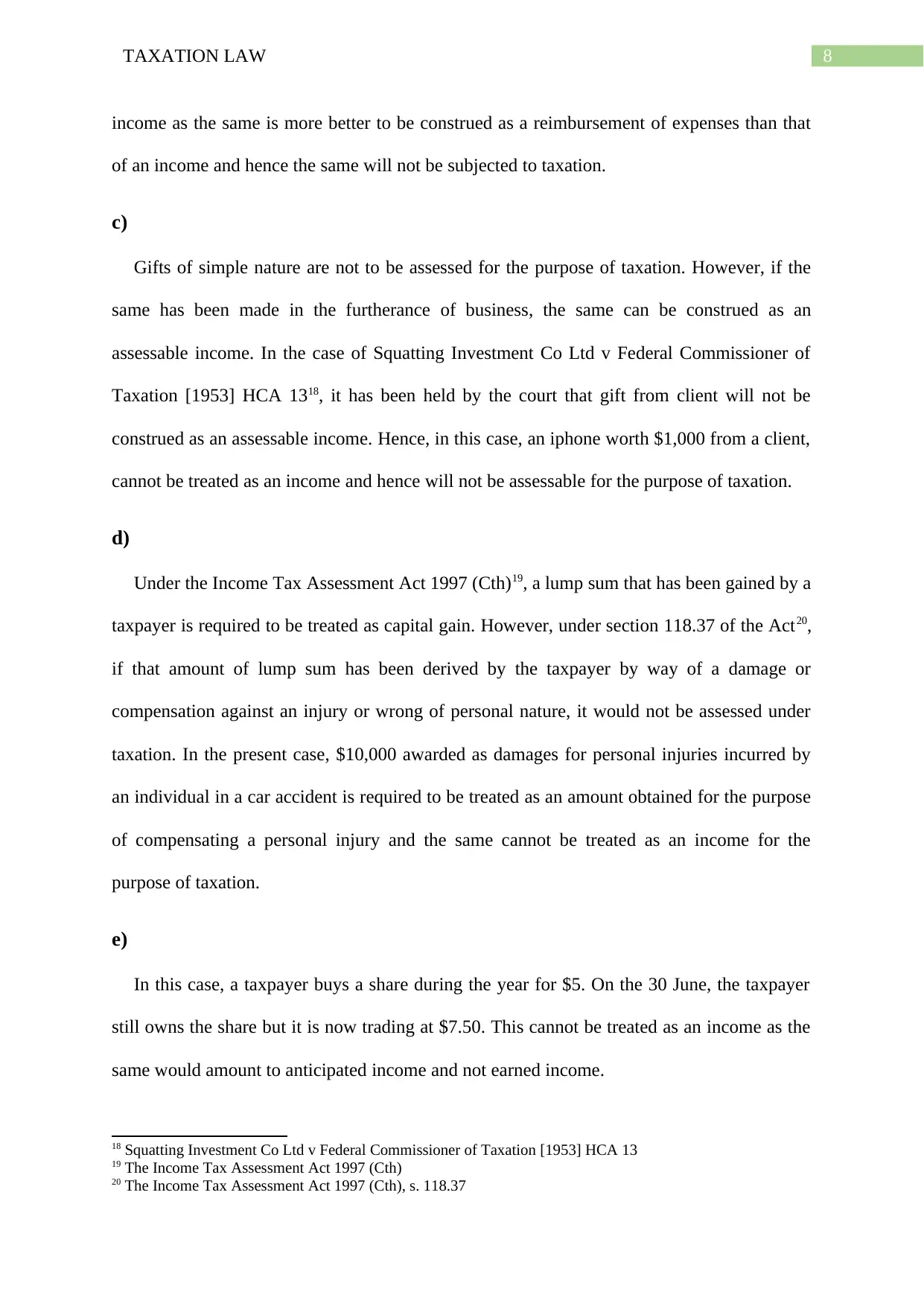
8TAXATION LAW
income as the same is more better to be construed as a reimbursement of expenses than that
of an income and hence the same will not be subjected to taxation.
c)
Gifts of simple nature are not to be assessed for the purpose of taxation. However, if the
same has been made in the furtherance of business, the same can be construed as an
assessable income. In the case of Squatting Investment Co Ltd v Federal Commissioner of
Taxation [1953] HCA 1318, it has been held by the court that gift from client will not be
construed as an assessable income. Hence, in this case, an iphone worth $1,000 from a client,
cannot be treated as an income and hence will not be assessable for the purpose of taxation.
d)
Under the Income Tax Assessment Act 1997 (Cth)19, a lump sum that has been gained by a
taxpayer is required to be treated as capital gain. However, under section 118.37 of the Act20,
if that amount of lump sum has been derived by the taxpayer by way of a damage or
compensation against an injury or wrong of personal nature, it would not be assessed under
taxation. In the present case, $10,000 awarded as damages for personal injuries incurred by
an individual in a car accident is required to be treated as an amount obtained for the purpose
of compensating a personal injury and the same cannot be treated as an income for the
purpose of taxation.
e)
In this case, a taxpayer buys a share during the year for $5. On the 30 June, the taxpayer
still owns the share but it is now trading at $7.50. This cannot be treated as an income as the
same would amount to anticipated income and not earned income.
18 Squatting Investment Co Ltd v Federal Commissioner of Taxation [1953] HCA 13
19 The Income Tax Assessment Act 1997 (Cth)
20 The Income Tax Assessment Act 1997 (Cth), s. 118.37
income as the same is more better to be construed as a reimbursement of expenses than that
of an income and hence the same will not be subjected to taxation.
c)
Gifts of simple nature are not to be assessed for the purpose of taxation. However, if the
same has been made in the furtherance of business, the same can be construed as an
assessable income. In the case of Squatting Investment Co Ltd v Federal Commissioner of
Taxation [1953] HCA 1318, it has been held by the court that gift from client will not be
construed as an assessable income. Hence, in this case, an iphone worth $1,000 from a client,
cannot be treated as an income and hence will not be assessable for the purpose of taxation.
d)
Under the Income Tax Assessment Act 1997 (Cth)19, a lump sum that has been gained by a
taxpayer is required to be treated as capital gain. However, under section 118.37 of the Act20,
if that amount of lump sum has been derived by the taxpayer by way of a damage or
compensation against an injury or wrong of personal nature, it would not be assessed under
taxation. In the present case, $10,000 awarded as damages for personal injuries incurred by
an individual in a car accident is required to be treated as an amount obtained for the purpose
of compensating a personal injury and the same cannot be treated as an income for the
purpose of taxation.
e)
In this case, a taxpayer buys a share during the year for $5. On the 30 June, the taxpayer
still owns the share but it is now trading at $7.50. This cannot be treated as an income as the
same would amount to anticipated income and not earned income.
18 Squatting Investment Co Ltd v Federal Commissioner of Taxation [1953] HCA 13
19 The Income Tax Assessment Act 1997 (Cth)
20 The Income Tax Assessment Act 1997 (Cth), s. 118.37
⊘ This is a preview!⊘
Do you want full access?
Subscribe today to unlock all pages.

Trusted by 1+ million students worldwide
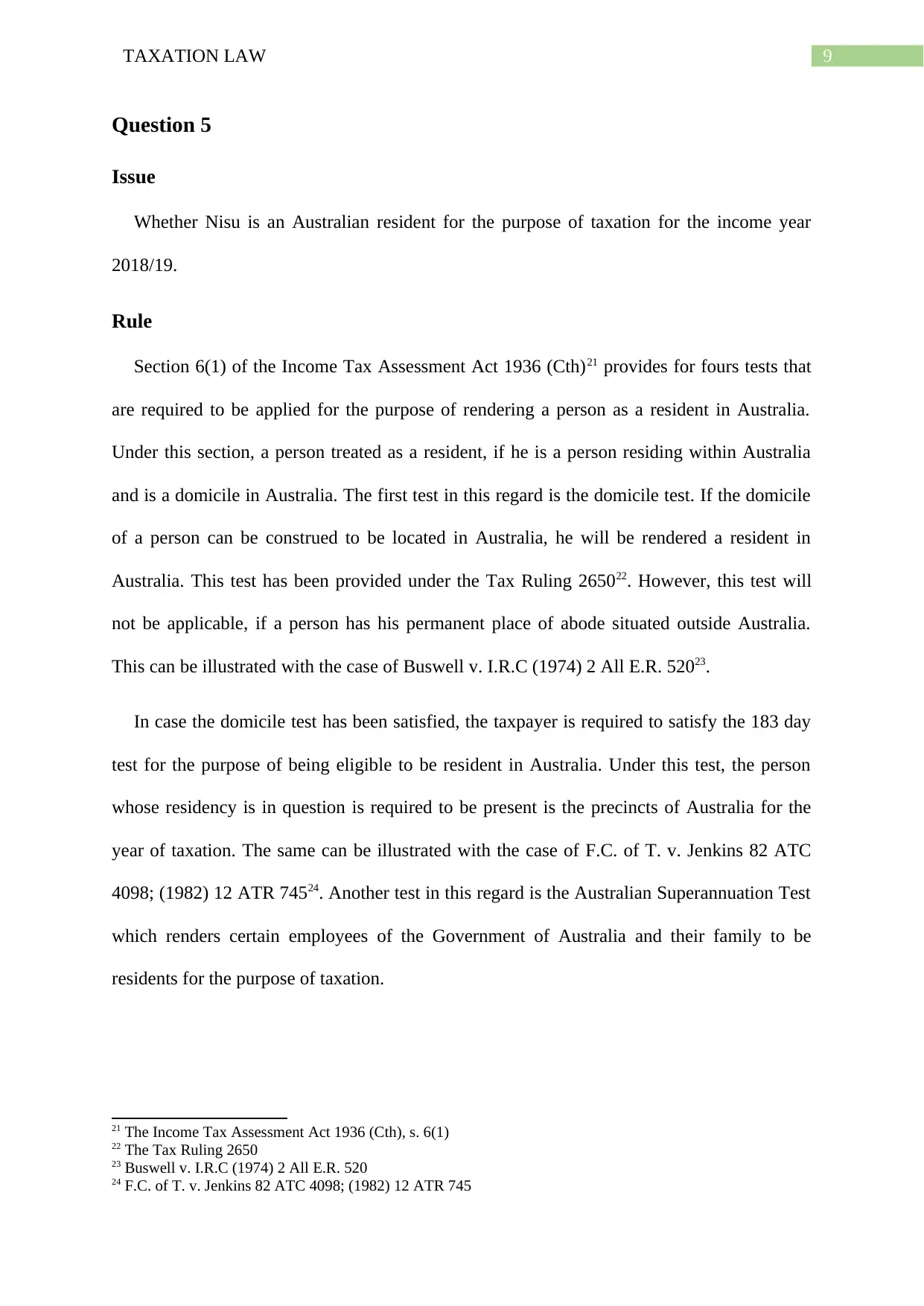
9TAXATION LAW
Question 5
Issue
Whether Nisu is an Australian resident for the purpose of taxation for the income year
2018/19.
Rule
Section 6(1) of the Income Tax Assessment Act 1936 (Cth)21 provides for fours tests that
are required to be applied for the purpose of rendering a person as a resident in Australia.
Under this section, a person treated as a resident, if he is a person residing within Australia
and is a domicile in Australia. The first test in this regard is the domicile test. If the domicile
of a person can be construed to be located in Australia, he will be rendered a resident in
Australia. This test has been provided under the Tax Ruling 265022. However, this test will
not be applicable, if a person has his permanent place of abode situated outside Australia.
This can be illustrated with the case of Buswell v. I.R.C (1974) 2 All E.R. 52023.
In case the domicile test has been satisfied, the taxpayer is required to satisfy the 183 day
test for the purpose of being eligible to be resident in Australia. Under this test, the person
whose residency is in question is required to be present is the precincts of Australia for the
year of taxation. The same can be illustrated with the case of F.C. of T. v. Jenkins 82 ATC
4098; (1982) 12 ATR 74524. Another test in this regard is the Australian Superannuation Test
which renders certain employees of the Government of Australia and their family to be
residents for the purpose of taxation.
21 The Income Tax Assessment Act 1936 (Cth), s. 6(1)
22 The Tax Ruling 2650
23 Buswell v. I.R.C (1974) 2 All E.R. 520
24 F.C. of T. v. Jenkins 82 ATC 4098; (1982) 12 ATR 745
Question 5
Issue
Whether Nisu is an Australian resident for the purpose of taxation for the income year
2018/19.
Rule
Section 6(1) of the Income Tax Assessment Act 1936 (Cth)21 provides for fours tests that
are required to be applied for the purpose of rendering a person as a resident in Australia.
Under this section, a person treated as a resident, if he is a person residing within Australia
and is a domicile in Australia. The first test in this regard is the domicile test. If the domicile
of a person can be construed to be located in Australia, he will be rendered a resident in
Australia. This test has been provided under the Tax Ruling 265022. However, this test will
not be applicable, if a person has his permanent place of abode situated outside Australia.
This can be illustrated with the case of Buswell v. I.R.C (1974) 2 All E.R. 52023.
In case the domicile test has been satisfied, the taxpayer is required to satisfy the 183 day
test for the purpose of being eligible to be resident in Australia. Under this test, the person
whose residency is in question is required to be present is the precincts of Australia for the
year of taxation. The same can be illustrated with the case of F.C. of T. v. Jenkins 82 ATC
4098; (1982) 12 ATR 74524. Another test in this regard is the Australian Superannuation Test
which renders certain employees of the Government of Australia and their family to be
residents for the purpose of taxation.
21 The Income Tax Assessment Act 1936 (Cth), s. 6(1)
22 The Tax Ruling 2650
23 Buswell v. I.R.C (1974) 2 All E.R. 520
24 F.C. of T. v. Jenkins 82 ATC 4098; (1982) 12 ATR 745
Paraphrase This Document
Need a fresh take? Get an instant paraphrase of this document with our AI Paraphraser
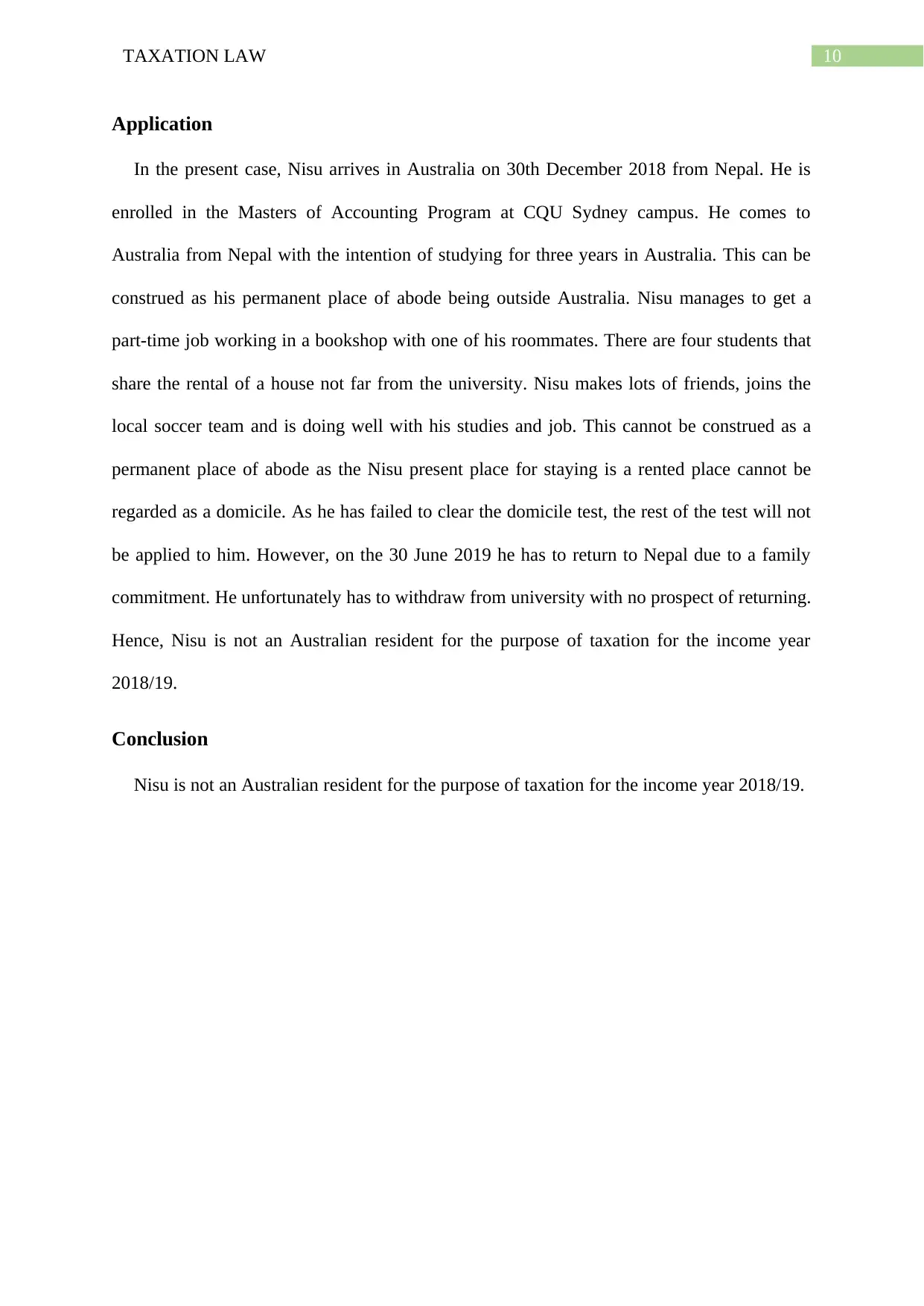
10TAXATION LAW
Application
In the present case, Nisu arrives in Australia on 30th December 2018 from Nepal. He is
enrolled in the Masters of Accounting Program at CQU Sydney campus. He comes to
Australia from Nepal with the intention of studying for three years in Australia. This can be
construed as his permanent place of abode being outside Australia. Nisu manages to get a
part-time job working in a bookshop with one of his roommates. There are four students that
share the rental of a house not far from the university. Nisu makes lots of friends, joins the
local soccer team and is doing well with his studies and job. This cannot be construed as a
permanent place of abode as the Nisu present place for staying is a rented place cannot be
regarded as a domicile. As he has failed to clear the domicile test, the rest of the test will not
be applied to him. However, on the 30 June 2019 he has to return to Nepal due to a family
commitment. He unfortunately has to withdraw from university with no prospect of returning.
Hence, Nisu is not an Australian resident for the purpose of taxation for the income year
2018/19.
Conclusion
Nisu is not an Australian resident for the purpose of taxation for the income year 2018/19.
Application
In the present case, Nisu arrives in Australia on 30th December 2018 from Nepal. He is
enrolled in the Masters of Accounting Program at CQU Sydney campus. He comes to
Australia from Nepal with the intention of studying for three years in Australia. This can be
construed as his permanent place of abode being outside Australia. Nisu manages to get a
part-time job working in a bookshop with one of his roommates. There are four students that
share the rental of a house not far from the university. Nisu makes lots of friends, joins the
local soccer team and is doing well with his studies and job. This cannot be construed as a
permanent place of abode as the Nisu present place for staying is a rented place cannot be
regarded as a domicile. As he has failed to clear the domicile test, the rest of the test will not
be applied to him. However, on the 30 June 2019 he has to return to Nepal due to a family
commitment. He unfortunately has to withdraw from university with no prospect of returning.
Hence, Nisu is not an Australian resident for the purpose of taxation for the income year
2018/19.
Conclusion
Nisu is not an Australian resident for the purpose of taxation for the income year 2018/19.
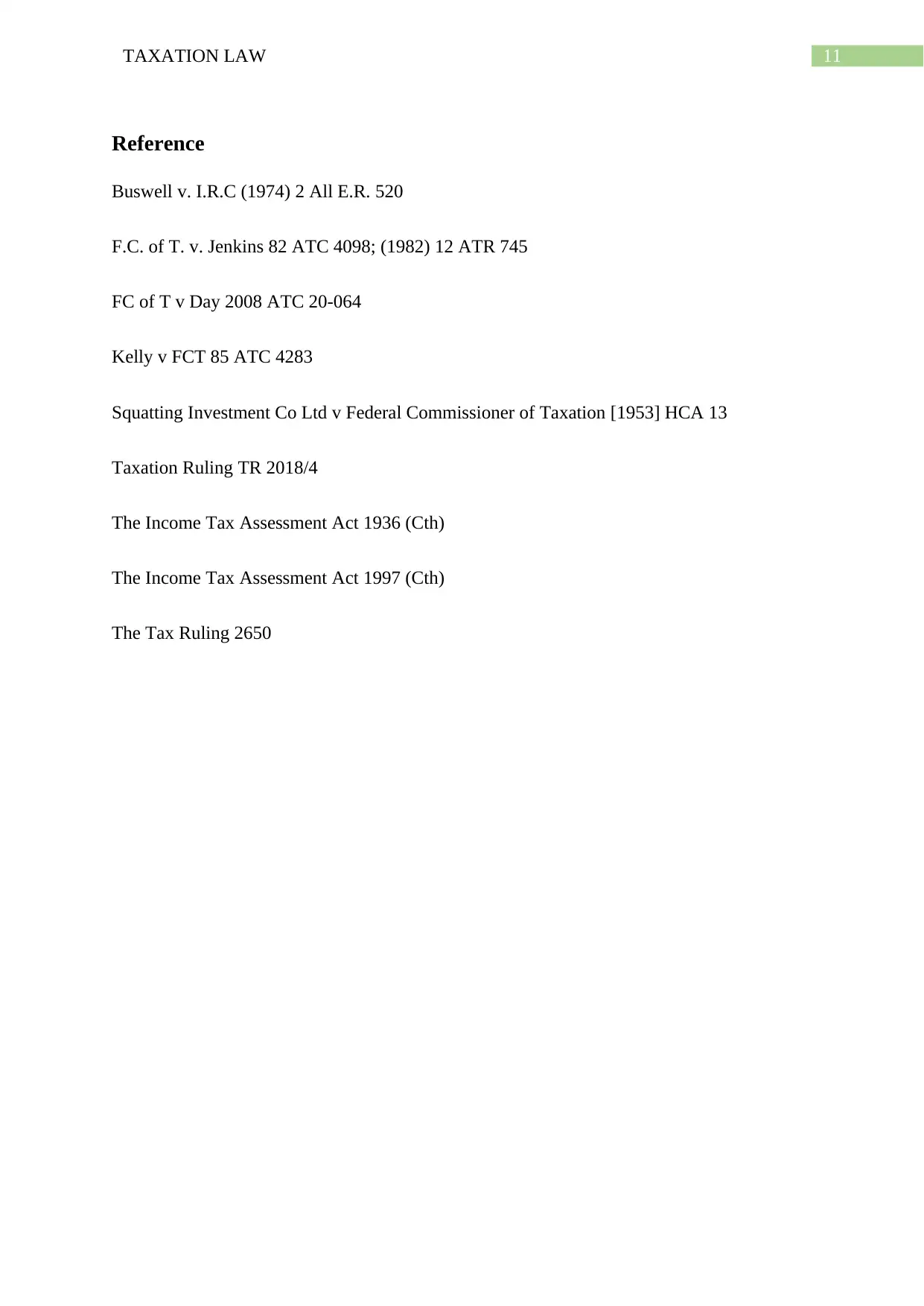
11TAXATION LAW
Reference
Buswell v. I.R.C (1974) 2 All E.R. 520
F.C. of T. v. Jenkins 82 ATC 4098; (1982) 12 ATR 745
FC of T v Day 2008 ATC 20-064
Kelly v FCT 85 ATC 4283
Squatting Investment Co Ltd v Federal Commissioner of Taxation [1953] HCA 13
Taxation Ruling TR 2018/4
The Income Tax Assessment Act 1936 (Cth)
The Income Tax Assessment Act 1997 (Cth)
The Tax Ruling 2650
Reference
Buswell v. I.R.C (1974) 2 All E.R. 520
F.C. of T. v. Jenkins 82 ATC 4098; (1982) 12 ATR 745
FC of T v Day 2008 ATC 20-064
Kelly v FCT 85 ATC 4283
Squatting Investment Co Ltd v Federal Commissioner of Taxation [1953] HCA 13
Taxation Ruling TR 2018/4
The Income Tax Assessment Act 1936 (Cth)
The Income Tax Assessment Act 1997 (Cth)
The Tax Ruling 2650
⊘ This is a preview!⊘
Do you want full access?
Subscribe today to unlock all pages.

Trusted by 1+ million students worldwide
1 out of 12
Related Documents
Your All-in-One AI-Powered Toolkit for Academic Success.
+13062052269
info@desklib.com
Available 24*7 on WhatsApp / Email
![[object Object]](/_next/static/media/star-bottom.7253800d.svg)
Unlock your academic potential
Copyright © 2020–2026 A2Z Services. All Rights Reserved. Developed and managed by ZUCOL.





